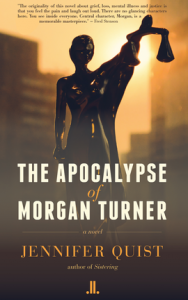Title: The Apocalypse of Morgan Turner
Author: Jennifer Quist
Publisher: Linda Leith Publishing
Year Published: 2018
Number of Pages: 300
Reviewed by Michael Austin
“Apocalypse” is one of those words that pretty much nobody knows how to use. Originally, the word meant “uncovering” or “revelation.” But it has become so closely associated with the last book of the New Testament–John’s end-of-the-world disaster porn about dragons and monsters and ultimate battles between good and evil–that almost everybody now uses it simply to mean “the end of the world.” And Francis Ford Coppola’s epic Vietnam War movie didn’t help at all.
So many people have used the word incorrectly for so long that it almost never pays to know the real meaning–except when one is reading the work of an exceptionally talented modern novelist who always pays serious attention to what words mean. This is to say that knowing what an apocalypse really is could not be more important for understanding Jennifer Quist’s excellent new novel, The Apocalypse of Morgan Turner.
The eponymous heroine of the novel, Morgan Turner, experiences what threatens to be an apocalypse in the incorrect sense of the word: before the novel begins, her sister has been brutally murdered by a boyfriend in a high-profile incident that has just about wrecked her family. Her divorced parents both use the tragedy to become local celebrities–her mother by demanding justice and her father by demanding forgiveness. Her brother, Paul, becomes increasingly alienated from the family, and Morgan herself tries desperately to construct some kind of narrative that can help her understand and reach some kind of closure.
What Morgan is looking for a way to exorcise both her grief and her persistent sense that the world has been submerged in evil. She becomes a death junkie. She takes a job in a slaughterhouse obsesses over horror films (appearances by The Seventh Seal, Nosferatu, and the Exorcist, as well as several versions of Dante’s Inferno. She wants a narrative that ends because she wants her horror story to end. Morgan wants to behold, once again, the stars.
Along the way, she makes friends with an unlikely collection of human beings: Gillian, the Mormon sister of the attorney who is prosecuting her own sister’s killer; Paul, Gillian’s other brother, who has many of the same psychotic tendencies as the killer (who is pleading “Not Criminally Responsible,” which is the Canadian version of the insanity defense); and Sheila, a Chinese co-worker who teaches her the rudiments of the Chinese language and introduces her to Korean soap operas.
These characters become Morgan’s symbolic family which, on paper, appears much more messed up than her real family but which, in practice, are amazingly functional as they lead her towards an actual apocalypse–the kind that is a revelation and not the kind that is the end of the world. And (as I read it at least) the revelation is bound up with the practical functionality of technically dysfunctional people–that’s vague, I know, but I am trying to make a good-faith effort to avoid spoilers.
The novel does not end with an earth-shattering revelation. There is no Mr. Rochester’s voice calling out over the heath. No lightening in the shape of an A flashing across the sky as she stands at the gallows. But there is a gradual uncovering of a kind of wisdom–and a kind of trust–that have the cumulative effect of changing Morgan Turner profoundly. And (as there is in Quist’s other novels), there is wisdom, grace, humor, and just enough freaky stuff to make it interesting.

